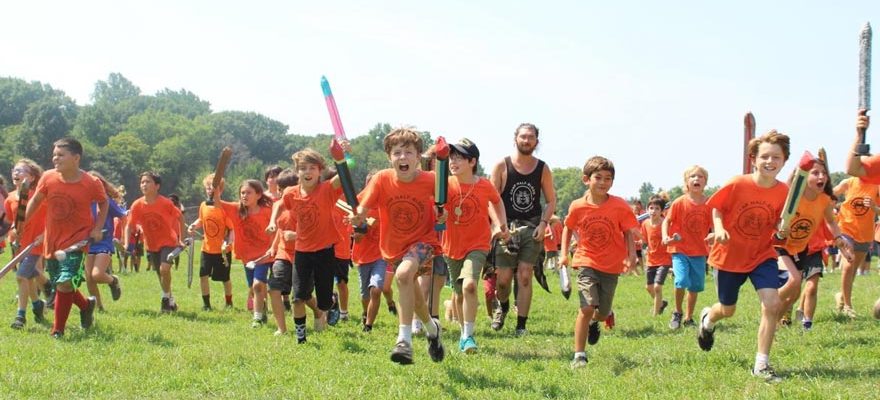
Now more than ever, kids need the close bonds formed at camp.
Summer camp is a place for kids to have fun and practice independence—but it’s also a unique opportunity for them to form deep, long-lasting friendships. The friends that kids make in camp—whether it’s day camp or sleepaway—often last years, even decades. In a survey of more than 5,000 families around the U.S., 69 percent of families said their camper was still in contact with the kids they met at camp. That’s why during this period of social isolation brought on by the pandemic, it’s more important than ever for kids to experience the kinds of friendships made at summer camp.
Making Friends at Summer Camp
Camp, as it turns out, is uniquely suited to provide all the very best ingredients for forming friendships: An escape from routine, shared activities, and exposure to new things—all happening under the watchful eye of well-trained role models. Here are a few reasons why those camp friendships form—and last—so powerfully.
Campers share their successes.
After a year of remote or hybrid school, kids are craving the opportunity to share an immediate and intimate experience with others their own age—which is exactly what happens at camp. Whether it’s a soccer match or an obstacle course—or at the Greek mythology-based Camp Half-Blood, potion-making and stealth games—campers achieve small successes together. This comradery leads to meaningful bonds.
Campers interact with each other—not screens.
Without screens, campers are forced to makes face-to-face contact (something that’s been in short supply lately). They can also have conversations without being distracted by a phone or other device; and they don’t have to worry about their social media profiles or “likes”—which makes every interaction more genuine and affirming. With the pressures of the outside world removed, what remains is a common routine and activities grounded in the present.
Campers share interests and experience.
Kids with unique interests or talents can bond over their shared passions. At Camp Half-Blood, when kids choose their “hometown” group (Athens, Mycenae, Sparta, Syracuse, Ithaca, and Thebes), like-minded demigods will gravitate to the same group, so the campers who chose Sparta share a love of sword-fighting and epic battles, while those who picked Athens enjoy strategy and trivia. Being with others who have the same interests can prevent kids from feeling isolated. It also makes “breaking the ice” a little easier when meeting new people.
Counselors inspire connections.
In addition to being a role model, a camp counselor’s job is to help kids form friendships. Many counselors, like those at Camp Half-Blood, have been campers themselves and have made friends through the experience—a process that they want to inspire in their campers. Also, counselors are trained to empower kids to feel comfortable contributing to the group. This leads a child to feel valued and confident, making it easier for her to find friends.
Campers can be themselves.
“Camp allows children to reinvent themselves and be who they want to be in a positive, supportive environment,” Jess Michaels, the communications director for the American Camp Association of New York and New Jersey, says. The shy child may become the outgoing child, and the child who may be not intro sports at home might be athletic at camp.
At Camp Half-Blood, campers gain the tools (from the fields of theater, fine arts, debate, imaginative inquiry, STEM—and of course, the fields of battle) to tell their own stories. Also kids at Camp Half-Blood get to choose their parent-god—their bandanna represents their choice: orange for Athena, yellow for Apollo, etc. And they get to choose their own electives. It’s an environment that encourages kids to figure out who they are and open themselves up—which leads to more honest relationships.
Sharing tradition leads to closeness.
Campers often connect over the themes and rituals that camp offers—whether that’s campfire songs or at Camp Half-Blood, the Olympics, when campers compete in sword-fighting, trivia, narrative art, and a foot race. These customs can keep campers in close contact after camp and returning year after year.
Diversity creates social awareness.
For some kids, camp may be their first time meeting people outside of their neighborhood or school. For others, it might be their first time meeting kids like themselves. Either way, kids will learn to interact with people of different backgrounds, practice asking questions and figuring out appropriate self-disclosure. They’ll also learn respect for others.
Campers will share memories.
What happens at camp tends to stick with kids for a long time. That might be sneaking out of their cabins or winning a game of tennis. At Camp Half-Blood, it might be a few epic rounds of Mythomagic (a tabletop role-playing game similar to Dungeons & Dragons)—or simply a meaningful conversation with a like-minded peer. These memories bind kids and lead to long-lasting friendships.
Sending your child to camp might be a difficult decision this year. There are potential health concerns and changes in protocols. On the other hand, it’s been a difficult year for kids and camp is probably exactly what they need, especially when it comes to connecting with others and making real friends.

